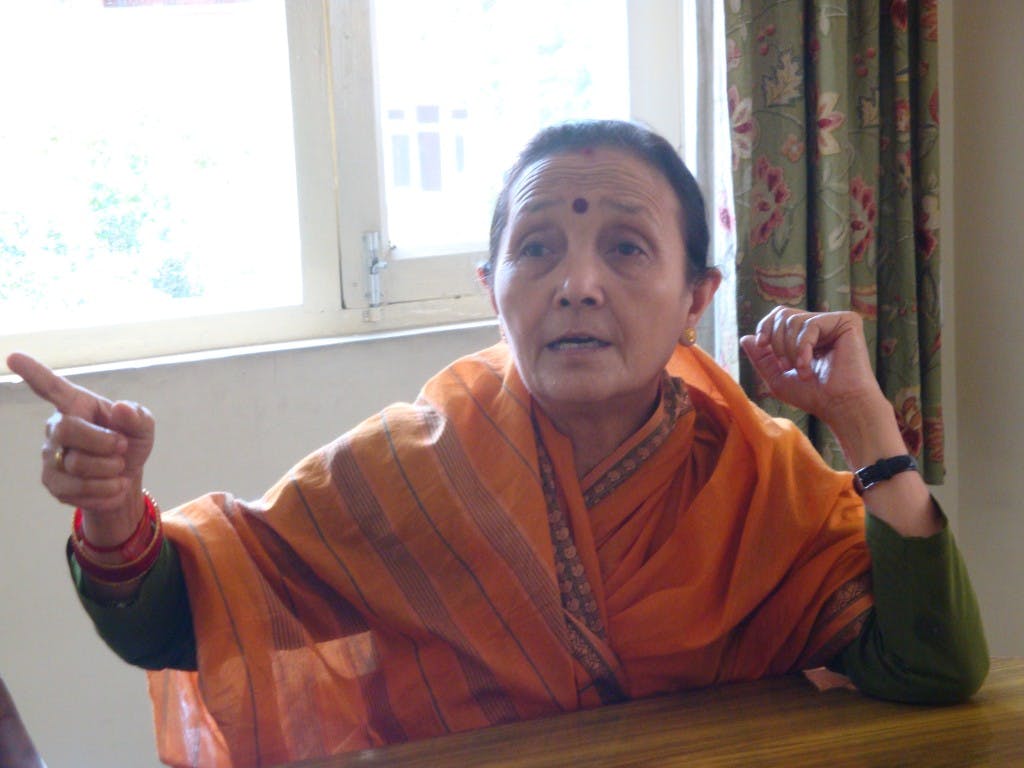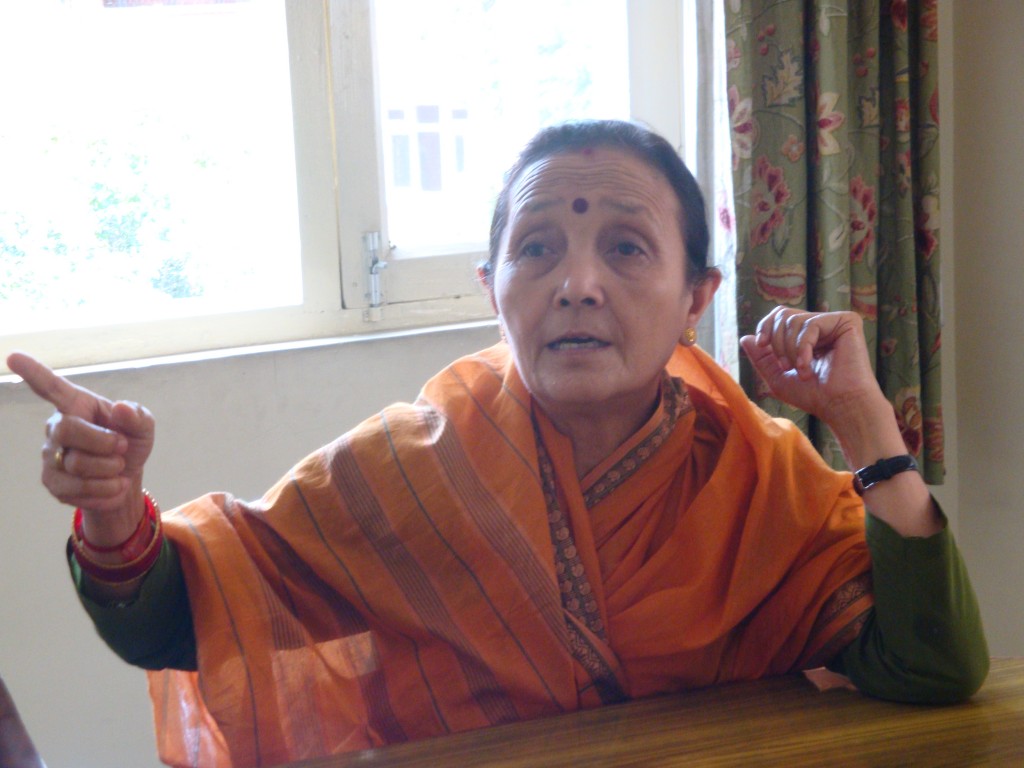Assignment 1 Draft:THE ANGEL OF MERCY FOR NEPALESE WOMEN
Jan 21, 2015
Story


Dear all,
I apologize for posting my draft this late, but i got to meet Ms Koirala just yesterday. I am not too content with my write up. Please help me improve:
A thousand things play in my head as I wait for Ms Anuradha Koirala to come to her office. “She does not talk much to journalists.” I remember one of my friends telling me. “Well, I am not a journalist, at least not for this meeting.” I said in defense to myself. How could she, a petite and almost frail looking lady, be perhaps the strongest opponent to girls’ trafficking in Nepal? How could she do all that she has done? What inspires her each day? What makes her work so hard despite all the threats and challenges? I had done my homework well and I knew what I was going to ask her. I was excited but nervous. Who wouldn’t be? She has been a huge role model for many young women in the country including myself.
As she walks in with her endearing smile, all my apprehension fades away. There is a certain magnetism about her that immediately draws a person towards her—may be it’s her soft eyes, her easy candor, or her firm conviction—whatever it is, Ms Koirala exudes an aura that’s certainly appealing.
From being a Professor of English to the crusader against girls’ trafficking, she has embarked on her journey with the courage of a warrior. “Not only society, even my family questioned my chastity. They blamed me of being a prostitute,” she said sadly. However, her innate perseverance shined through when she added that, “In the absence of challenges, there is no need to work. If we stop working with the fear of challenges, we cannot improve the society.” For all the courage, quite inevitably, numerous awards have come her way, including, Celebrating Womanhood Award (2002), The Courage of Conscience Award (2006), Queen Sophia Centre Silver Medal (2007),The UNWO Nepal Certificate of Appreciation (2008), Outstanding Management Award (2009), among others.
In her quest to protect Nepali Girls’ and women from crimes like domestic violence, trafficking for flesh trade, child prostitution, child labor, and various forms of exploitation and torture, Ms Koirala started Maiti Nepal (literal translation ‘Mother’s Home’) in the year 1993, with the little money she earned as a lecturer, and the support of a group of socially committed students and professionals like teachers, journalists, lawyers, and social workers.
A Global Report on Trafficking in Persons 2009 published by The United Nations Office on Drugs and Crime (UNODC) states that “Nepal is a source country for men, women, and children trafficked for the purposes of commercial sexual exploitation and involuntary servitude.” Although there is a lack of reliable statistics, it is estimated that 10,000-15,000 Nepali women and girls are trafficked to India annually, while 7.500 children are trafficked domestically for commercial sexual exploitation. Additionally, women and girls are also trafficked to The Middle East, and other Asian destinations including Malaysia, Hong Kong, and South Korea. The trade is backed by poverty, gender disparity, illiteracy, and greed. Little girls averaging 7-14 years of age are given away to brothels, where they must service 5-25 clients a day. Resistant girls are tortured, gang raped, and threatened until they submit. Many girls contract HIV as well as other STDs, and are forced to endure numerous abortions.
What Ms Koirala started by making personal loans of NRs 1,000 ($15) to eight female beggars and prostitutes to set up Nanglo Pasals (small stalls) with the hope to reshape their lives, has transformed into an organization that not only prevents trafficking for forced prostitution, but also works to find justice for the victimized girls and women by engaging in criminal investigation and waging legal battles against the criminals.
Among the many roles that she has taken up, Assistant for Ministry for Women, Children and Welfare was one of the most depressing one. For a person brought up in a family that valued discipline and time, it was hard for Ms Koirala to fathom the realities of the Ministry, which she says had no sense of discipline and time. Through her stay, the first thing she changed was the languid attitude of the employees, by emphasizing on punctuality and dedication. She also raised the agendas of girls’ trafficking, adoption laws and sexual exploitation of children during her brief tenure at the Ministry.
She was referred to as an “Angel of Mercy” (the title is also given to Mother Teresa of Calcutta) by Prince Charles after his visit to Maiti Nepal’s Shelter Homes in February 1998. Touched by her work, Prince Charles did something he had never done before. He used a tabloid newspaper to sell 500 prints of water-color he painted of Annapurna Himalayan Mountain Range for £150 each in his bid to raise funds for her endeavors. The newspaper had also printed a letter from Charles mentioning "selfless dedication and sacrifice" of Ms Koirala, who, he mentioned to be "living under constant threat of retribution."
Despite everything that she and her organization is doing from building shelter homes to transit points, to prevention homes and hospice, Ms Koirala is still struggling to get government’s support to address the issue. “I cannot create a world free from trafficking without government’s effort and support of other I/NGOs,” she expressed.
In addition to seeing a world free from trafficking, her yet to be fulfilled dreams include the establishment of Maternity Homes and Children’s Hospital in the Eastern and Western regions of the country. Like the determined spirit that she is, she is struggling hard to realize her dreams even at this age.
After my close encounter with this Angel of Mercy, as I leave the Maiti Nepal office, I think about the documentary made by Ms Koirala where a victim of trafficking says, “The day I was sold, was the day that my God died.” This powerful and well researched documentary acquired the title “The Day My God Died”. But maybe God never died for the girl, because He was never “born”. He is just among us in different forms like Anuradha Koirala. After all, God does act in mysterious ways.
This article is part of a writing assignment for Voices of Our Future, which is providing rigorous web 2.0 and new media training for 31 emerging women leaders. We are speaking out for social change from some of the most forgotten corners of the world. Meet Us.




